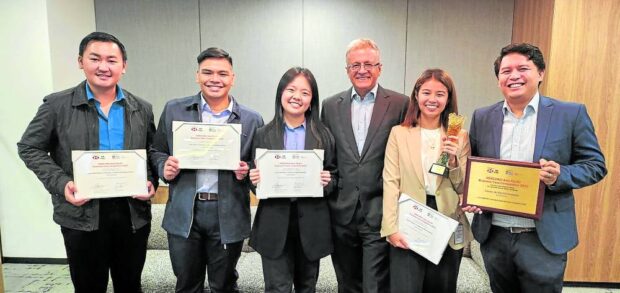
CHAMPION Ateneo de Manila wins HSBC/HKU Asia Pacific Business Case Competition: (From left) Darren Carrandang, Louie Miranda, Joyce Ong, HSBC Philippines CEO Sandeep Uppal, Julianne Co and team coach James Soriano — Contributed photo
How can a multibillion dollar pharmaceutical giant running operations in 16 international markets and employing over 12,000 employees across the globe make an even bigger impact?
According to this team of young Ateneans, it will require an efficient supply chain monitoring system, partnerships with government and institutions to improve health record registry and incorporation of blockchain. This latest technology, a highly advanced ledger that stores and secures data in the digital highway, has been a buzz word for quite some time now and has evolved into several use cases being employed by different industries.
With that well-crafted, multipronged proposal—which took six hours of intense brainstorming—Darren Carandang, Joyce Ong, Julianne Co and Louie Miranda were crowned as the champion of the 2023 HSBC/HKU Asia Pacific Business Competition. It is the world’s largest contest of its kind for undergraduate students from 19 locations across the region.
The Ateneo de Manila University team, which trained for several months prior to the competition, beat other 1,000 contestants. The business case problem, provided by Hong Kong University Business School, challenged participants to come up with an innovative proposal resolving the handling and distribution of medicines of Zuellig with the use of blockchain.
“Technology is transforming businesses around the world, including the banking industry. Keeping ahead of these trends will help make our younger generations stronger as our business leaders of tomorrow,” HSBC Philippines president and CEO Sandeep Uppal says.
Choosing location
In any business plan, choosing the target market is crucial to the success of the company. This team believes Indonesia is the most attractive destination to launch their blockchain-enabled strategy.
Ong says this Asian country is ideal because of its big population, making it a good market size to maximize revenue generation.
“Their tech infrastructure is quite good already, which is important because this is a tech solution. So for people to be able to use it, they need to be tech savvy, they need to have smart phones. And Indonesia satisfied that criteria,” she explains.
The team views Indonesia as the “model country” that can be the standard of implementation for the rest of the region.
Apart from this, the Ateneans see the need to have a private sector intervention in the country to alleviate the problems of the health-care sector.
“The government … is looking into solutions for their health-care system. Our blockchain solutions come in as a partner for the government to enable better health-care solutions for the country,” Carandang says.
“Their public health-care system wasn’t really that refined yet so there was a lot of room for us to be able to help,” Ong adds.
Cold chain logistics
Co says the blockchain play comes into the management of the company’s cold chain logistics, which is critical to ensure temperature-controlled delivery of perishable pharmaceutical products.
“We can use blockchain to better track and keep the data from the different cold chain logistics that we have. In that way, medical companies can have a better visibility of the transport of the different medicines, like vaccines and serums,” Ong explains.
Apart from keeping every log organized, Co says that the information collected from blockchain-backed databases can help the company generate meaningful insights. These include medicine demand forecasting, which can help the company maximize market opportunities.
“For example, we know about which diseases are becoming more prevalent so then, the government can make better public health-care policies using our AI (artificial intelligence)-generated insights,” Co explains.
“We can use that data for public health institutions to know which medicines to develop more and where to sell them to,” she adds.
Accessible health records
The team of Ateneans took a step further in their proposal when they suggested building a health-care record system in the blockchain. They want to realize this project through a public-private partnership between the company and the Indonesian government.
“We also decided to use blockchain to make a public health-care system for the Indonesians so that the health records are easily accessible and therefore health care is more easily provided to those who need it the most,” Co shares.
The goal is to make health records of each individual available in all hospitals and health-care institutions, which is seen to help in making informed diagnosis on patients wherever they are admitted. For this to be successful, Carandang stresses the need to put in measures ensuring data privacy so patients will be comfortable sharing their personal data. He explains that blockchain technology can enable secure storage of such information, which can be accessed through password log-ins.
In addition, the team says that patients must be educated as well on how the universal health-care database can help them in the long run.
Avenue for learning
Uppal says this competition provides an avenue for the future professionals to hone their critical thinking skills.
This year, there were 24 teams that competed, representing the following countries: Australia, Canada, Bangladesh, mainland China, India, Indonesia, Japan, Macau, Malaysia, Mauritius, Serbia, Singapore, South Korea, Sri Lanka, Taiwan, Thailand, Philippines and Vietnam.
Ateneo took home a $10,000 cash prize after emerging as the number one team.
City University of Hong Kong came in second while RMIT University Vietnam settled at third, winning $5,000 and $2,000, respectively.
“The HSBC/HKU Asia Pacific Business Case competition indeed provides undergraduates across Asia-Pacific the opportunity to step out of an academic setting and develop solutions to real-world problems,” Uppal says.
“May the experiences and learning the team has gained serve as guide as they soon navigate their careers in the real corporate world,” he adds.

